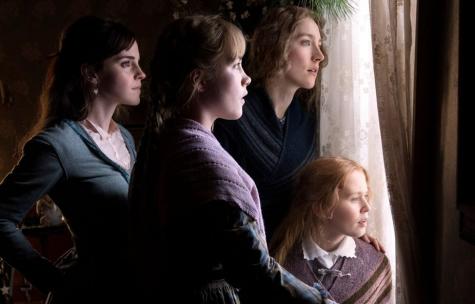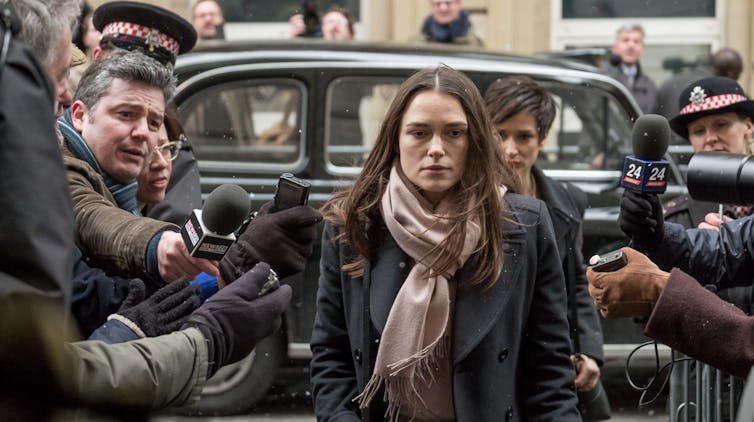Fifty Shades of Grey is just an old-fashioned romance – that's the problem
It is difficult to write about Fifty Shades without being caught up in excess: translated into 51 languages, more than 100m copies sold, 50m-plus views of the trailer on YouTube. This is the novel that has spiced up (heterosexual) marital bedrooms and led to its own range of sex toys.
To cash in on the film’s release, British DIY retailer B&Q has advised staff to expect soaring sales of cable ties and duct tape. There’s even a limited edition Fifty Shades of Surf laundry detergent to help with the post-coital clean up.
From the trilogy’s sadistic billionaire to laundry detergent might seem like quite a leap. But at the heart of Fifty Shades' success has been the juxtaposition of the apparent ordinariness of both the novel’s heroine Ana Steele and the middle-aged, middle-class mother who wrote it (originally as Twilight fan fiction) with the extraordinarily wealthy, extraordinarily sexy, extraordinarily messed-up Christian Grey.
Despite, or perhaps because of, its resolutely heterosexual address, the Fifty Shades phenomenon has been defined by women’s relationships with one another as much, if not more than, with men. This has clearly been played on in the portrayal of director Sam Taylor-Johnson ahead of the film’s release: another middle-aged mum, overlooked professionally after the birth of her four children, given a second chance by Fifty Shades.
Of course, there’s also been much criticism of the book and, now, the film. At times, this criticism has itself been steeped in a barely disguised misogyny directed towards author, fans or director. This has, in turn, made it easier for Fifty Shades' supporters to claim that the phenomenon is doing feminist work. So the challenge for feminist critics of Fifty Shades is to air our concerns without pandering to mainstream media’s penchant for pitting women against women, or being dragged into a discussion about the relative merits of particular sexual practices.
Love and abuse
Looked at more closely, the sex in Fifty Shades turns out to be something of a distraction. One of the most resilient claims about the book – central to Universal’s Valentine’s release strategy for the film – is that it is, underneath all the distracting “kinky fuckery”, a love story.
I agree. This is not an endorsement, it is simply a statement about the kind of story it is. While the sex is certainly not irrelevant, it is love which is most consistently used as a justification for abuse outside the parameters of BDSM.
It is not surprising, then, that much of the criticism of Fifty Shades has come from feminists delivering frontline services to women fleeing domestic abuse. The most high-profile campaign against the film, hash-tagged #50dollarsnot50shades, encourages potential viewers to recognise this connection by donating the price of their cinema tickets to a local refuge.
What is really happening
Sam Taylor-Johnson’s most recent interviews seem designed to get it back on safer ground: “do feminists always have to be on top?” she asks. Despite the reality of her own struggles to get back “on top” professionally after the birth of her children, this is meant to be a sexual and not a social question.
It should go without saying that women (and men) can and do choose to engage in a spectrum of BDSM-related activities. If these choices are made between participants who have an equal standing in the negotiation then I fail to see why this should be anyone else’s business.
But there’s the problem. Christian and Ana are not equals outside of their sexual relationship, and so the fantasy of sexual submission collides with a more brutal reality. I’m far less concerned with what Ana and Christian do in the bedroom (and in the bath, the elevator, the car, on the piano …) than how Christian’s controlling behaviour outside of it not only determines the conditions of Ana’s “consent” but is in itself a form of abuse.
He monitors what she eats and drinks, what she drives, where she works, what she wears, who she sees, what they do. More insidiously, he does all of this because he loves her and his wealth legitimates and luxuriously brands his choices. It’s not for nothing that this has been dubbed “wealth porn”. What’s more, Christian’s controlling behaviour is repeatedly shown to save Ana – from herself as well as from a stream of men whose intentions she dangerously misreads.
This is what feminists have long referred to as the male-protection racket. It’s the plot of countless romance novels whose naïve, young protagonists are paired with more worldly powerful men. Thirty years on, the debate over Fifty Shades has become more hedonistic while arguably serving an equally conservative function: the end destination is still heterosexual marriage and children, with other options quickly closed down.
Fifty shades of entitlement
Positioning herself firmly within the demographic the book has appealed to, James has repeatedly, if somewhat coyly, spoken of the pleasures of conducting her research for the novel’s sex scenes with her husband. The novel was her fantasy, written for herself in the first instance.
Whether individual women find new pleasure from butt plugs is not the point here. Rather, the novel’s engagement with broader debates about gendered violence and power cannot be fantasised away. After all, one of the constants across all three novels is Ana’s explicit labelling of Christian’s controlling behaviour outside the bedroom as “stalking”. Yet she accepts that he does it because he loves her.
This is consistent with a wider cultural script in which obsessive male behaviour and men’s sense of entitlement to women is still too often legitimated, with concrete, material effects on women’s safety and lives. Ana agrees to marry Christian aged 21, and just weeks into their relationship, because he needs reassurance that she is “his”, she modifies her behaviour to contain his rage, in recognition of the maternal neglect and paedophilic abuse (by an older woman) which has brought him here. Male violence is women’s responsibility.
And it’s this, rather than any of the sexual practices, which troubles me most about Fifty Shades. It undoes feminism not because Ana “chooses” to be submissive in some of their sexual scenes, but rather because it uses BDSM as a smokescreen to disguise a very conventional abusive relationship.
This article was originally published on The Conversation. Read the original article.
Karen Boyle is Director of the Centre for Gender and Feminist Studies and the only Professor of Feminist Media Studies in the UK. She is Programme Director for the MLitt/MSc in Gender Studies (Applied) and Co-Dirtector of the MLitt in Film Studies: Theory and Practice.
Karen Boyle has an MA in Women's Studies (Applied) from the University of Bradford and conducted her PhD research on violence, gender and representation in mainstream cinema at the Violence, Abuse and Gender Relations Research Unit, also at Bradford. Her first academic post was as a Lecturer in Women's Studies at the University of Wolverhampton, after which she moved to the University of Glasgow where she was Senior Lecturer in Film & Television Studies before joining the University of Stirling in February 2013.
She has continued to maintain a research interest in violence, gender and representation, focusing more recently on pornography and the sexualisation of culture. Karen is also interested in questions of gender and genre, and female authorship, particularly in cinema.
Karen Boyle is Director of the postgraduate programme in Gender Studies (Applied) and contributes to the core courses Understanding Gender and Feminist Research, as well as co-ordinating the Gender Studies Research Placement. On the Film Studies side, she also co-ordinates the Film Studies Research Placement and teaches the Core Course Film Studies: Form and Analysis.
Karen Boyle is the Research Postgraduate Convenor for Communications, Media & Culture and welcomes all enquiries about PhD study in the field. She is an experienced supervisor of PhD students and would be keen to see new applications in the broad areas of feminist film, television and media studies; pornography and sexuality; gendered violence and representation; audience research and genre studies.
Karen Boyle has been a member of the Board of Directors of the feminist anti-violence organisation the Women's Support Project for more than a decade.
Please click here for ways to follow what's new on Facts & Arts.














